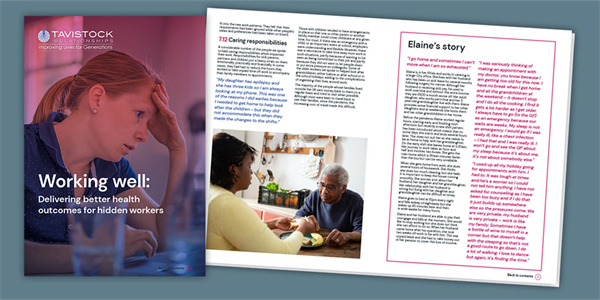This includes those people who keep everything working smoothly and safely in our businesses and buildings, but are not officially employees. Over the last two years, the City Mental Health Alliance has been working with a collaboration of organisations, including Legal and General, City of London, Bank of England and PwC, to increase awareness of the need to support what is sometimes called the unseen – or hidden – workforce. This can include cleaners, security guards, front of house staff and maintenance workers.
Commissioned by Legal & General, Tavistock Relationships published research to increase understanding of the challenges faced by hidden workers and recommend ways to improve their daily lives. Sarah Ingram, Associate Director of Strategy & Partnerships at Tavistock Relationships reflects on the findings of new research on this subject, which also clearly shows how businesses can play a role in helping to tackle health and wellbeing inequality.
The Working Well: Delivering Better Outcomes for Hidden Workers report used quantitative and qualitative analysis to understand the challenges faced by the hidden workforce includes cleaning, catering, security and maintenance staff.
The majority of people interviewed spoke about the impact of the very long hours they work, their working conditions and long commutes on their physical and mental health, plus on the relationships they have with their partners, children and family.
For example, Latifa , a single mum in her early forties work s long hour s as a cleaner in a large office in the City of London . She works a five- day week from 5am to 5pm , and on Tuesdays, Wednesdays and Thursdays she also does a seven-hour shift from 7pm to 2am cleaning in a school. She says, “Work makes me physically tired all the time and sometimes mentally tired too. When I get home I am too tired. I listen to music. I would like to go to dance classes but I am tired, tired, tired. But I am happy because I am working.”
M any workers do not receive pay if they attend a hospital, GP o r other health appointment, and f ear of losing pay or appearing weak or unreliable prevents them from asking for time off to look after their health.
Very few respondents had accessed counselling or advice services, and were unaware of how they could access these services if they wanted to do so.
They spoke about their mental health in many different ways . Some were open about issues such as anxiety and depression and how they managed the challenges they faced. Others told us how they dealt with the pressures in their lives but did not want to discuss ‘mental health’ as such. Most of the people we spoke to made it clear that they were very unlikely to discuss their mental health or any of their personal concerns with colleagues or managers. However, most said that they would be happy to talk to a counsellor or other adviser who was independent of their employer.
The report’s recommendations for employers to improve the daily lives of hidden workers include:
- giving certainty of hours so workers can plan to mitigate some of the impact of their working hours;
- ensure a suitable space is made available for rest and eating; make provision for confidential calls to health professionals and schools;
- review shift patterns and start times to avoid unsocial travel and working h ours;
- provide guidance on sick pay policy for t hird party employment contracts; and
- specify death in s ervice as a minimum requirement.
Through consultation with its supply chain partners and a review of its existing arrangements, Legal & General has committed to: i ntroduce sick pay policies , without waiting days and at the same level as standard pay ; p rovide access for a ll workers to virtual healthcare services , including GP appointments ; and p rovide d eath in service benefit as standard .
We hope this report will lead to employers having a better understanding of the enormous challenges faced by their unseen workers, their hopes and needs, and to follow Legal & General’s commitments to take meaningful steps to improve their lives .
To read the Working Well: Delivering Better Outcomes for Hidden Workers report , and find out about the free and low cost therapy services offered by Tavistock Relationships, as well as their relationships app Between Us, go to Improving the health and wellbeing of hidden workers (tavistockrelationships.org)





